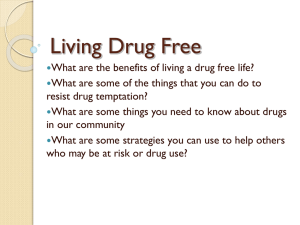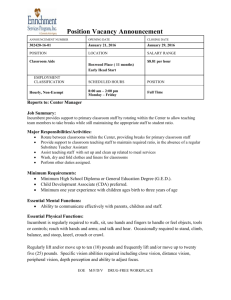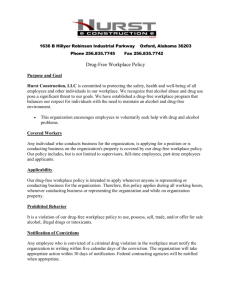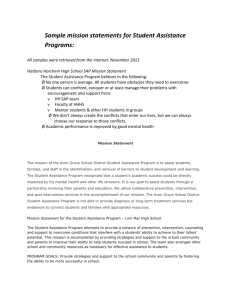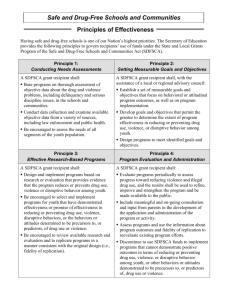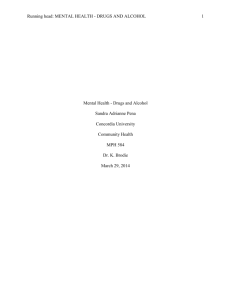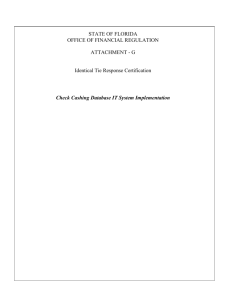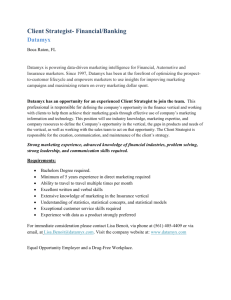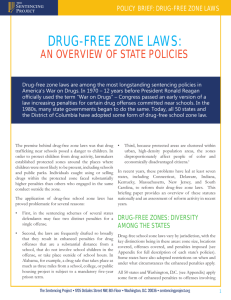drug free work place
advertisement
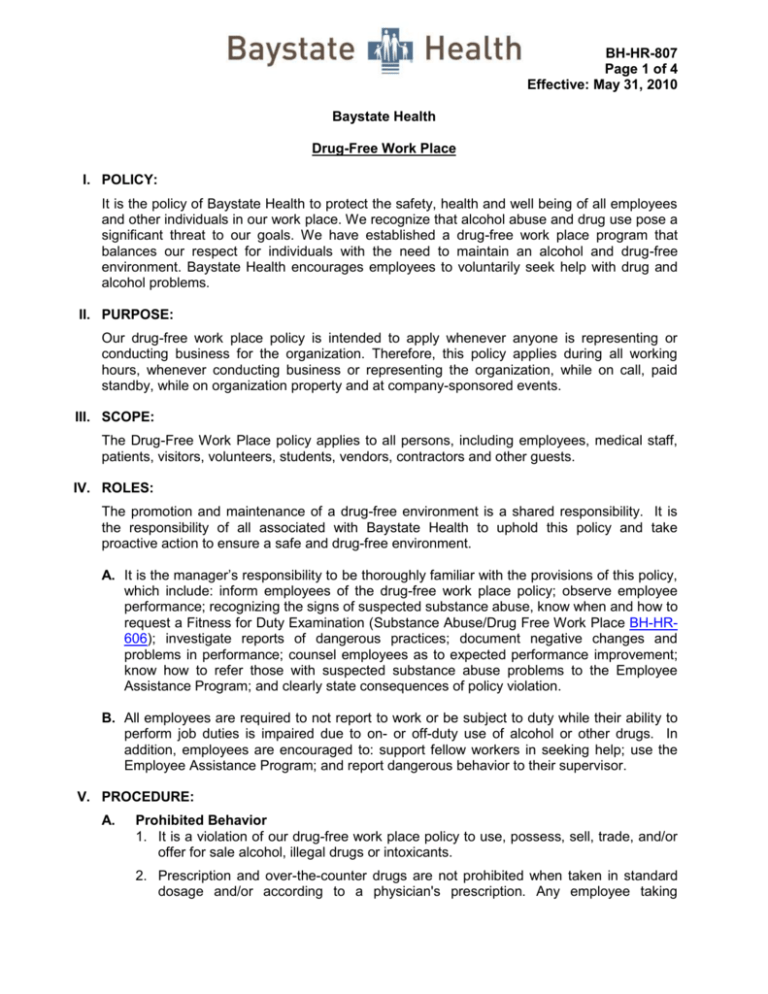
BH-HR-807 Page 1 of 4 Effective: May 31, 2010 Baystate Health Drug-Free Work Place I. POLICY: It is the policy of Baystate Health to protect the safety, health and well being of all employees and other individuals in our work place. We recognize that alcohol abuse and drug use pose a significant threat to our goals. We have established a drug-free work place program that balances our respect for individuals with the need to maintain an alcohol and drug-free environment. Baystate Health encourages employees to voluntarily seek help with drug and alcohol problems. II. PURPOSE: Our drug-free work place policy is intended to apply whenever anyone is representing or conducting business for the organization. Therefore, this policy applies during all working hours, whenever conducting business or representing the organization, while on call, paid standby, while on organization property and at company-sponsored events. III. SCOPE: The Drug-Free Work Place policy applies to all persons, including employees, medical staff, patients, visitors, volunteers, students, vendors, contractors and other guests. IV. ROLES: The promotion and maintenance of a drug-free environment is a shared responsibility. It is the responsibility of all associated with Baystate Health to uphold this policy and take proactive action to ensure a safe and drug-free environment. A. It is the manager’s responsibility to be thoroughly familiar with the provisions of this policy, which include: inform employees of the drug-free work place policy; observe employee performance; recognizing the signs of suspected substance abuse, know when and how to request a Fitness for Duty Examination (Substance Abuse/Drug Free Work Place BH-HR606); investigate reports of dangerous practices; document negative changes and problems in performance; counsel employees as to expected performance improvement; know how to refer those with suspected substance abuse problems to the Employee Assistance Program; and clearly state consequences of policy violation. B. All employees are required to not report to work or be subject to duty while their ability to perform job duties is impaired due to on- or off-duty use of alcohol or other drugs. In addition, employees are encouraged to: support fellow workers in seeking help; use the Employee Assistance Program; and report dangerous behavior to their supervisor. V. PROCEDURE: A. Prohibited Behavior 1. It is a violation of our drug-free work place policy to use, possess, sell, trade, and/or offer for sale alcohol, illegal drugs or intoxicants. 2. Prescription and over-the-counter drugs are not prohibited when taken in standard dosage and/or according to a physician's prescription. Any employee taking BH-HR-807 Page 2 of 4 Effective: May 31, 2010 prescribed or over-the-counter medications will be responsible for consulting the prescribing physician and/or pharmacist to ascertain whether the medication may interfere with safe performance of his/her job. If the use of a medication could compromise the safety of the employee, fellow employees or the public, it is the employee's responsibility to take appropriate action to avoid unsafe work place practices. For instance, depending on the severity of the situation the employee may call in sick, apply for a leave of absence, request change of duty, notify supervisor, and notify Employee Health Services. 3. The illegal or unauthorized use of prescription drugs is prohibited. It is a violation of our drug-free work place policy to intentionally misuse and/or abuse prescription medications. In addition, certain licensure requirements may necessitate additional reporting (Board of Registration in Medicine, Board of Registration in Nursing, Department of Transportation, MA Board of Pharmacy, etc.) B. Notification of Convictions Any employee who is convicted of a criminal drug violation in the work place must notify the organization in writing within five calendar days of the conviction. The organization will take appropriate action within 30 days of the employee notification to the organization. The employer will notify the contracting agency within 10 days after receiving notice from the employee, or otherwise receiving actual notice, of a criminal drug conviction. C. Searches Entering the organization's property constitutes consent to searches and inspections. If an individual is suspected of violating the drug-free work place policy, he or she may be asked to submit to a search or inspection at any time. Searches can be conducted of pockets and clothing, lockers, wallets, purses, briefcases and lunchboxes, desks and work stations and vehicles and equipment. D. Drug Testing 1. To ensure the accuracy and fairness of our testing program, all testing will be conducted according to Substance Abuse and Mental Health Services Administration (SAMHSA) guidelines where applicable and will include a screening test; a confirmation test; the opportunity for a split sample; review by a Medical Review Officer, including the opportunity for employees who test positive to provide a legitimate medical explanation, such as a physician's prescription, for the positive result; and a documented chain of custody. 2. All drug-testing information will be maintained in separate confidential records. 3. Each employee, as a condition of employment, will be required to participate in preemployment, post-accident, reasonable suspicion and return-to-duty testing upon selection or request of management. 4. The substances that will be tested for are: Amphetamines, Cannabinoids (THC), Cocaine, Opiates, Phencyclidine (PCP), Alcohol, Barbiturates, Benzodiazepines, Methadone and Propoxyphene. 5. Testing for the presence of alcohol will be conducted by analysis of breath and blood. BH-HR-807 Page 3 of 4 Effective: May 31, 2010 6. Testing for the presence of the metabolites of drugs will be conducted by the analysis of urine, blood, hair and saliva. 7. Any employee who tests positive will be immediately removed from duty, placed on administrative leave without pay, referred to the Employee Assistance Program for assessment and recommendations, required to successfully complete recommended rehabilitation including continuing care, required to pass a Return-to-Duty test and sign a Return-to-Work Agreement, subject to ongoing, unannounced, follow-up testing for a period of two years and terminated immediately if he/she tests positive a second time or violates the Return-to-Work Agreement. 8. An employee will be subject to the same consequences of a positive test if he/she refuses the screening or the test, adulterates or dilutes the specimen, substitutes the specimen with that from another person or sends an imposter, will not sign the required forms or refuses to cooperate in the testing process in such a way that prevents completion of the test. E. Consequences 1. One of the goals of our drug-free work place program is to encourage employees to voluntarily seek help with alcohol and/or drug problems. If, however, an individual violates the policy, the consequences are serious. 2. In the case of applicants, if he or she violates the drug-free work place policy, the offer of employment can be withdrawn. The applicant may reapply after twelve months and must successfully pass a pre-employment drug test. 3. If an employee violates the policy, he or she will be subject to corrective action and may be required to enter rehabilitation. An employee required to enter rehabilitation who fails to successfully complete it and/or repeatedly violates the policy will be terminated from employment. Nothing in this policy prohibits the employee from being disciplined or discharged for other violations and/or performance problems. F. Return-to-Work Agreements Following a violation of the drug-free work place policy, an employee may be offered an opportunity to participate in rehabilitation. In such cases, the employee must sign and abide by the terms set forth in a Return-to-Work Agreement as a condition of continued employment. G. Assistance Baystate Health recognizes that alcohol and drug abuse and addiction are treatable illnesses. We also realize that early intervention and support improve the success of rehabilitation. To support our employees, our drug-free work place policy: Encourages employees to seek help if they are concerned that they or their family members may have a drug and/or alcohol problem. Encourages employees to utilize the services of qualified professionals in the community to assess the seriousness of suspected drug or alcohol problems and identify appropriate sources of help. Ensures the availability of a current list of qualified community professionals. Offers all employees and their family members assistance with alcohol and drug problems through the Employee Assistance Program (EAP). Allows the use of accrued paid leave while seeking treatment for alcohol and other drug problems. BH-HR-807 Page 4 of 4 Effective: May 31, 2010 Treatment for alcoholism and/or other drug use disorders may be covered by the employee benefit plan. However, the ultimate financial responsibility for recommended treatment belongs to the employee. H. Confidentiality All information received by the organization through the drug-free work place program is confidential communication. Access to this information is limited to those who have a legitimate need to know in compliance with relevant laws and management policies. VI. REVIEWED/APPROVED BY: Senior Employee Relations Consultant, 8/7/2009 VII. PROPONENT: Director, Human Resource Consulting and Employee Relations Approval: __________________________________ Paula C. Squires, SPHR Senior Vice President, Human Resources Replaces: Policy Name: HR-127 Drug Free Work Place Policy Date: 10/01/2009
